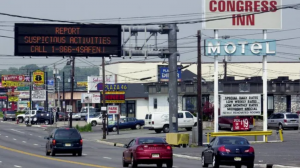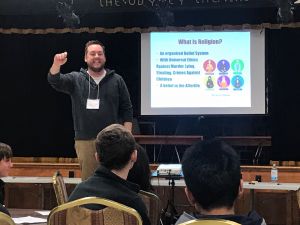Somewhere between the first and second floors of a roadside motel off of Route 46, in a stuffy, yellowed stairwell that smelled of stale cigarettes, a middle-aged woman approached my delivery partner, an affable young woman from a neighboring faith community, and asked us for a meal. We were delivering meals as part of our walk-in dinner program. Since the pandemic our guests are staying in four motels on or around Route 46.
“Sure,” I told the aged woman. “Let us finish these deliveries and we’ll walk up and meet you back here.” She wasn’t on our assigned list but we carry extra meals for this kind of event all the time. We finished the deliveries and I gave the woman her meal, she snatched it from me and made her way down the dark hallway. I thought nothing of it, but back in the car, my partner remarked that the woman didn’t seem very grateful. It bothered her that the woman didn’t notice how we had to go back and get the meal and admitting it was, for sure, a hassle for us. My partner’s remark is a variation of ones I’ve heard throughout my time in social justice work and especially during this pandemic. A remark that has something to do with how hungry people should behave and, perhaps larger, who really deserves what.
It reminded me of Dorothy Day’s remark. When a person asked Day, Shouldn’t people who make bad choices: bad spending habits, drinkers, drug addicts, etcetera—shouldn’t they get what they deserve? Loss of a home, loss of resources? Day remarked, “God help us if we should get what we deserve.” Now, I’m not as prickly-wise as Dorothy Day, so I just said gruffly, and perhaps passive aggressively to my partner, “It’s fine” and made our way back to the kitchen in Hackensack.
The episode has got me thinking a lot about gratitude. What I am grateful for this Lent and what it means to serve people in a truly authentic way, and while I’m thinking of authenticity I should probably begin with myself. Over the next few weeks, in this Lenten season of giving, I’m going to stop and have a “mirror moment,” that is, look in the mirror and ask myself, What does it mean to give of ourselves and ask how am I living the Gospel message?
In my Confirmation classes when I teach our teens, I share stories and reports from my work with the hungry, and I share the story above and write the following on the board:
(fill in the blank) people are people.
In this case, (hungry) people are people.
Hungry people are people? “Of course!” they say. I ask them not to dismiss me so easily. Hungry people are people and like all people, some are nice, some are kinda mean and most are indifferent.
Let’s continue the exercise.
Hungry people aren’t rude. That woman, from my story, was rude. She was rude, like us, for any number of reasons, though my guess is it probably stems from the fact that she, unlike us, has to ask two strangers for a plastic container filled with lukewarm food while living in a motel that you would never find me in.
Let’s continue with an example that isn’t so seemingly drastic. (Wealthy) people are people. “They are greedier than others,” a student suggests. No. A wealthy person can be greedy, but the few I know tend to be pretty well balanced. In fact, the wealthy people I know kinda act like the poor people I know, and the middle class people I know . . . some are nice, some are kinda mean and most are indifferent.
People are people, are people.
“Hungry people, because they are hungry, try and take advantage more, but it is OK, because they have to fight a broken system,” a student passionately yells, filled with a newfound justice we see on the news.
“Yes,” I say, but I correct her. Some hungry people do try and take advantage, but it is because all people try and take advantage sometimes regardless of economic or caloric need.
For every possible—and it’s less rare than you think—lie or hustle I see from guests we serve food to, it is no different than every lie or hustle we do. People are people. I hustle everyday! I fill my day with innumerable corruptions, I smile in pleasure with every double scan of a coupon, every car I don’t let onto Route 4 with selfish driving and the countless cons I care not to share in this space.
“Beggars can’t be choosers!” the old saw goes. I guarantee whoever said that, first, doesn’t know anything about begging and has always had choices. Funny, why is it the people with power always seem to determine how those without should behave.
To be devoid of choice especially in a society that values it so much is devastating.
I can relate. After Hurricane Andrew destroyed our Miami suburb in the mid-1990s, my family, like hundreds, formed lines for food at churches. College students and others came to help. I should’ve been grateful, I guess, but I wasn’t a very well-behaved beggar.
The anger that brimmed in me was palpable. I seethed while standing on the line, hated the young people who cooed over my baby brother and was silently furious at my sister’s “please” and “thank you” to the volunteers. As good-natured as the volunteers were, I didn’t want to be cute for them. I greeted their energetic “good mornings” with cold preadolescent dissonance.
The fact that I was so dependent on them infuriated me and to see college students feeding my father (who was at the time my exact age now) was devastating— the pang of shame and disgust can still be felt as I write these very words.
People are people.
“OK, but what about the people who are serving, they are doing special work, God’s work. They should be respected,” a student adds.
Often people are very kind to me. Thinking I must be special, or “holy,” and, therefore, because of my experiences as a struggling kid, I should be treated as better. I have to remind them, I’m not an angel that fell from heaven. I’m sometimes nice, sometimes mean and mostly indifferent in my reactions with people. You generously pay me to do this work, and that’s the true lesson. We are simply no different, other than our economic realties—no different from the ones we serve.
I’ve accompanied teens and adults on dozens of service trips, domestic, local and internationally, and as part of the day’s work we always “check in” with them, to explore how they are doing—what are their ups and downs, what are they struggling with, what are they enjoying—inevitably the students will say, usually toward the end of the trip, some version of “I thought I was helping others, but have discovered I’m helping myself.” And that’s when I know the lesson clicked.
Service is not for the ones we serve, but for ourselves. That’s the point of our service, the reason why Christ tells us, “We’ll always have the poor.” The life we save is indeed our own.
I have to remind myself all the time, because it’s OK to feel upset and hurt when people hurt us. The woman in the stairwell deserves my partner’s scorn for being rude, but just for being rude. Not for being poor and hungry and because she takes us up our service doesn’t mean she has to give up her choice to be rude. She should or shouldn’t do anything.
If I’m going to take this moment seriously, Christ’s call to serve others seriously, I need to embrace a radical equality I may not be ready for. To remove all judgment and to see into the masked face of the person whose door I’m knocking on to deliver meatloaf to, is my face.
And yes, there are countless stories of hungry people thanking volunteers. My favorite from this past year is when a man promised me that when he is back on his feet he will look us up and serve with us—return the generosity. That’s a beautiful story and I hope to serve alongside him soon, but he doesn’t condemn his fellow brothers and sisters if they don’t feel the same way.
Our understanding of poor people shouldn’t make them precious. I’ve worked with many a social justice warrior that can almost fetishize the hungry—seeing them as living a truer existence than the rich. We insult them by thinking the hungry are all sweet or should be sweet. “Tiny Tim” syndrome I call it. It insults us, too. It says people with economic security aren’t living authentic lives. Owning two cars doesn’t make someone inauthentic—well, it may, but not because they own two cars!
If we are taking the call to service seriously, and I know many of us do, then we shouldn’t worry how the person in need should behave. If we are truly serving Christ in others, then we are so lucky! How lucky we are that Christ has asked us to help, how privileged we are to be able to give someone something they’ve asked for with dignity, non-judgmental love, the same non-judgmental love Christ gives us!




